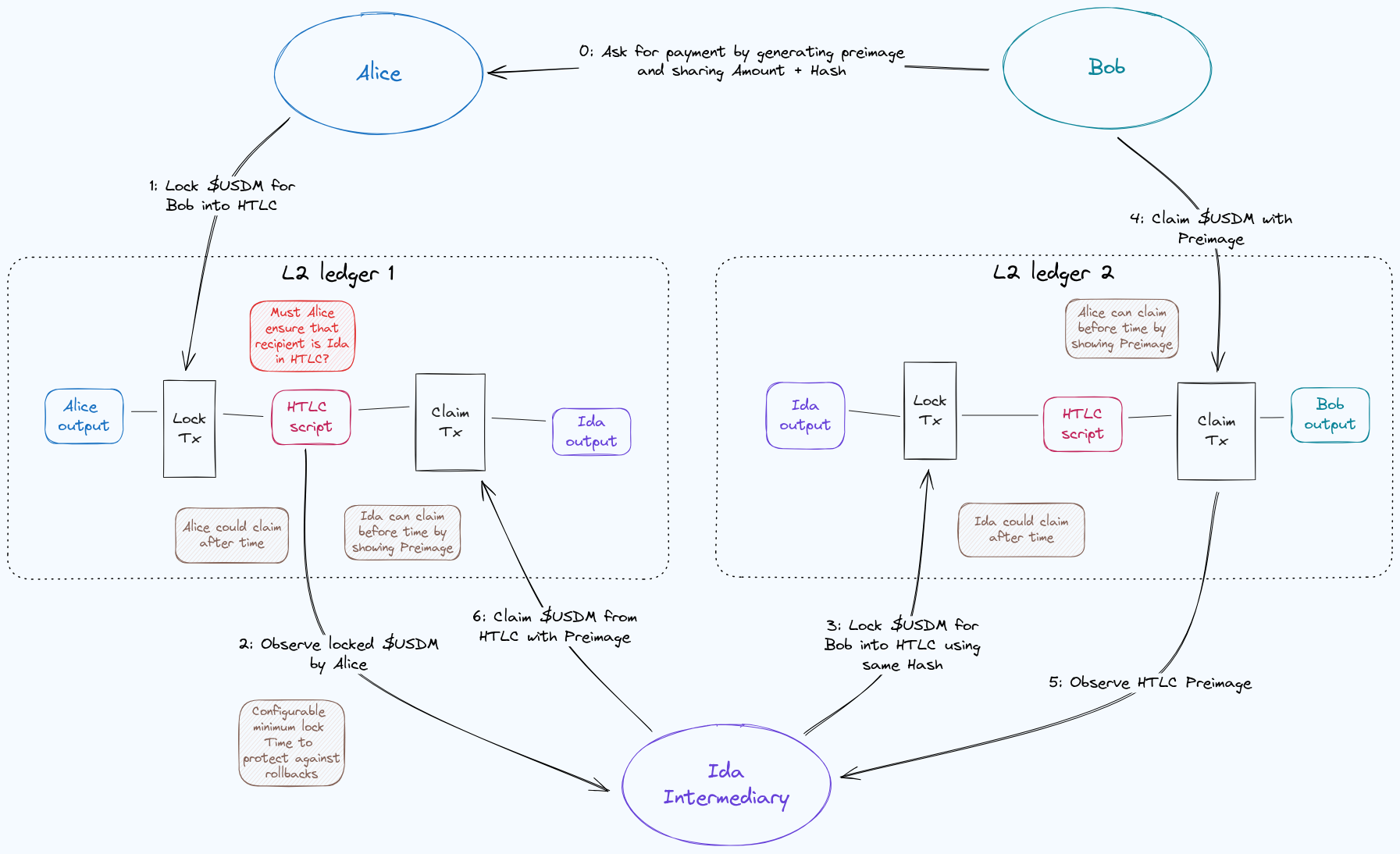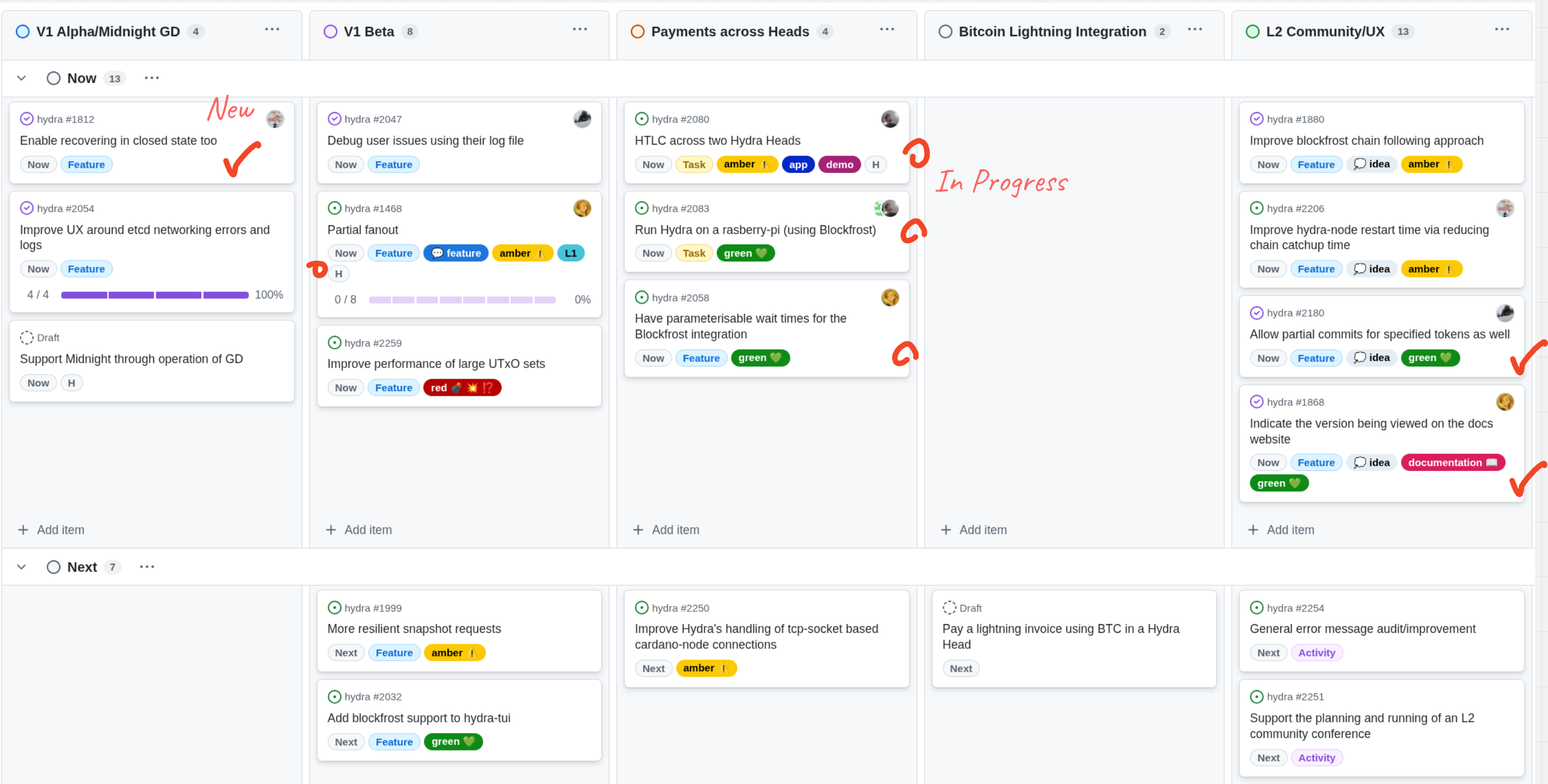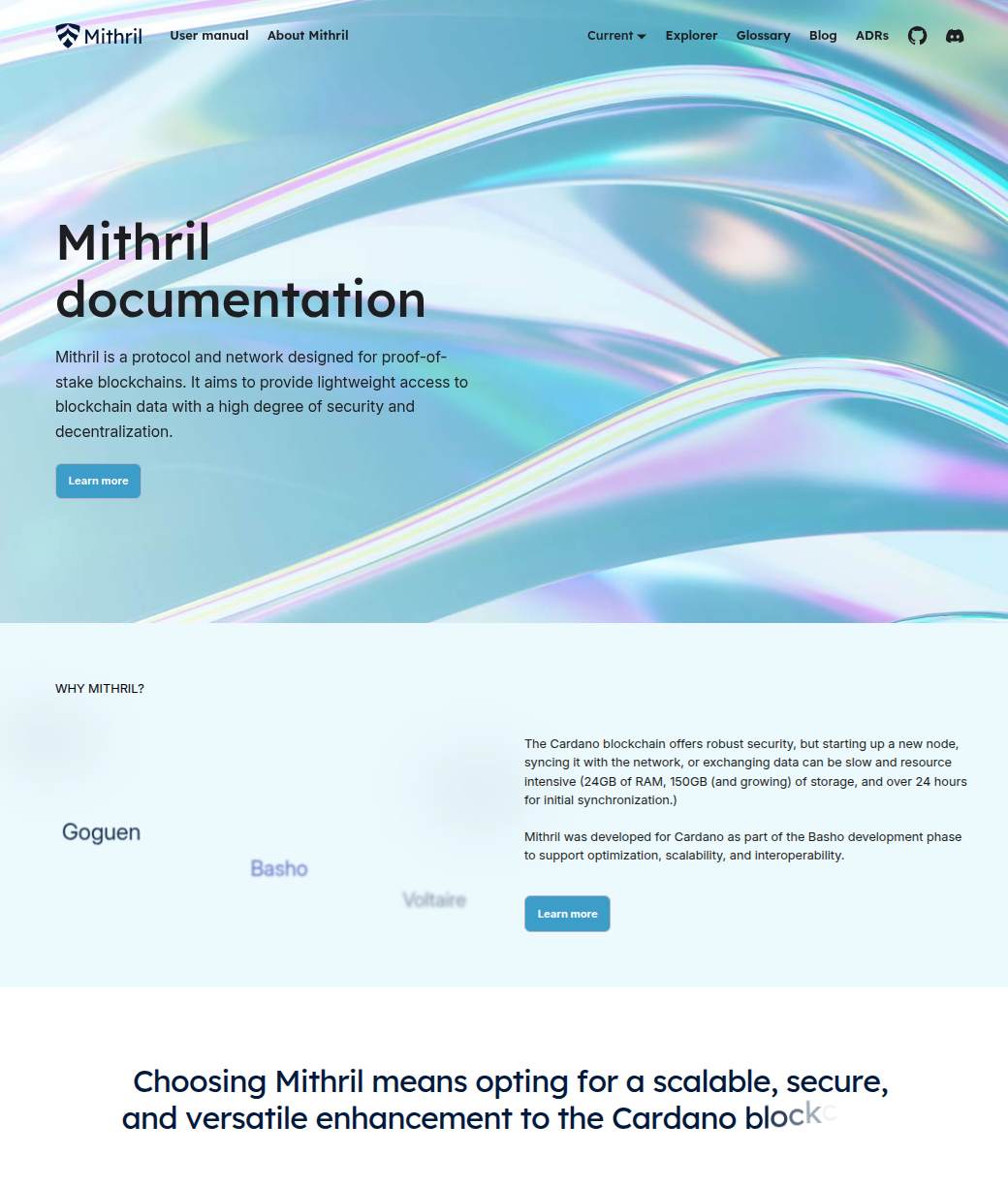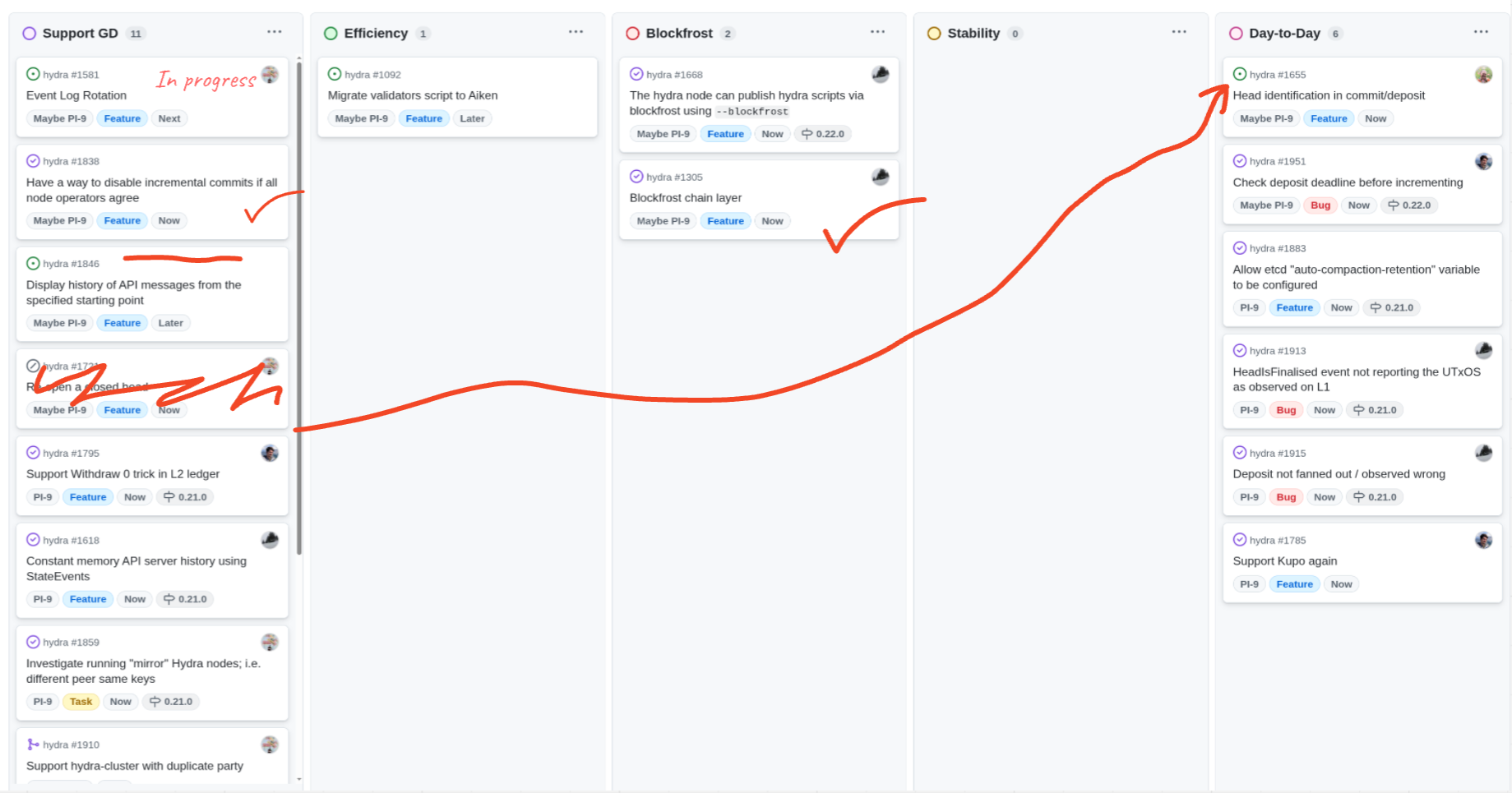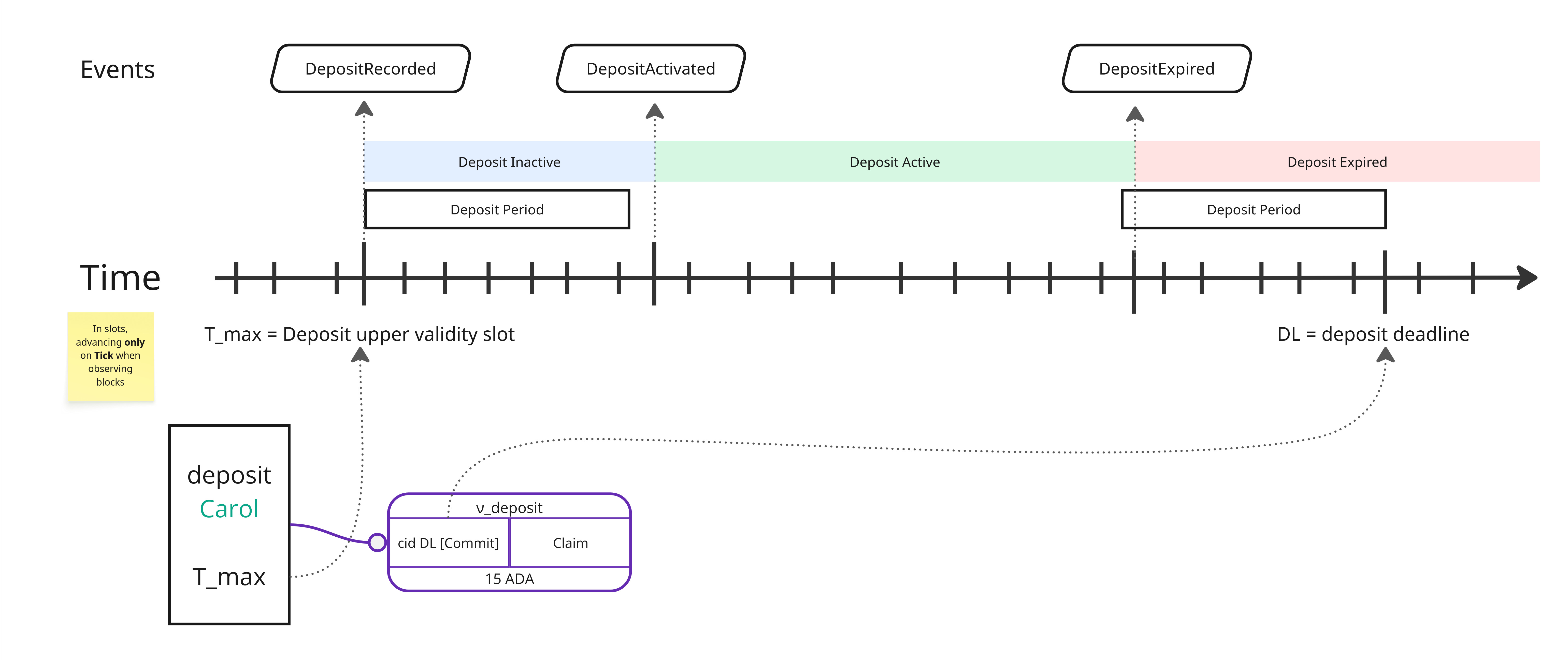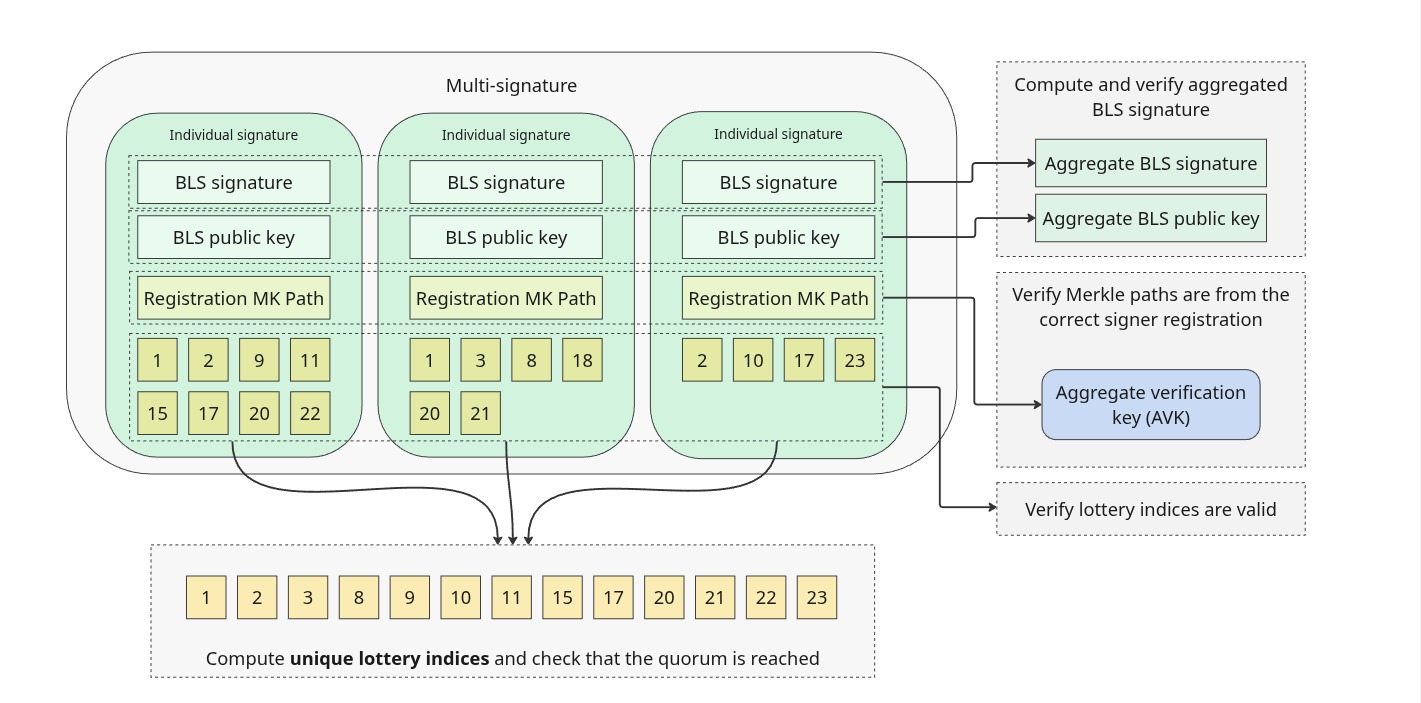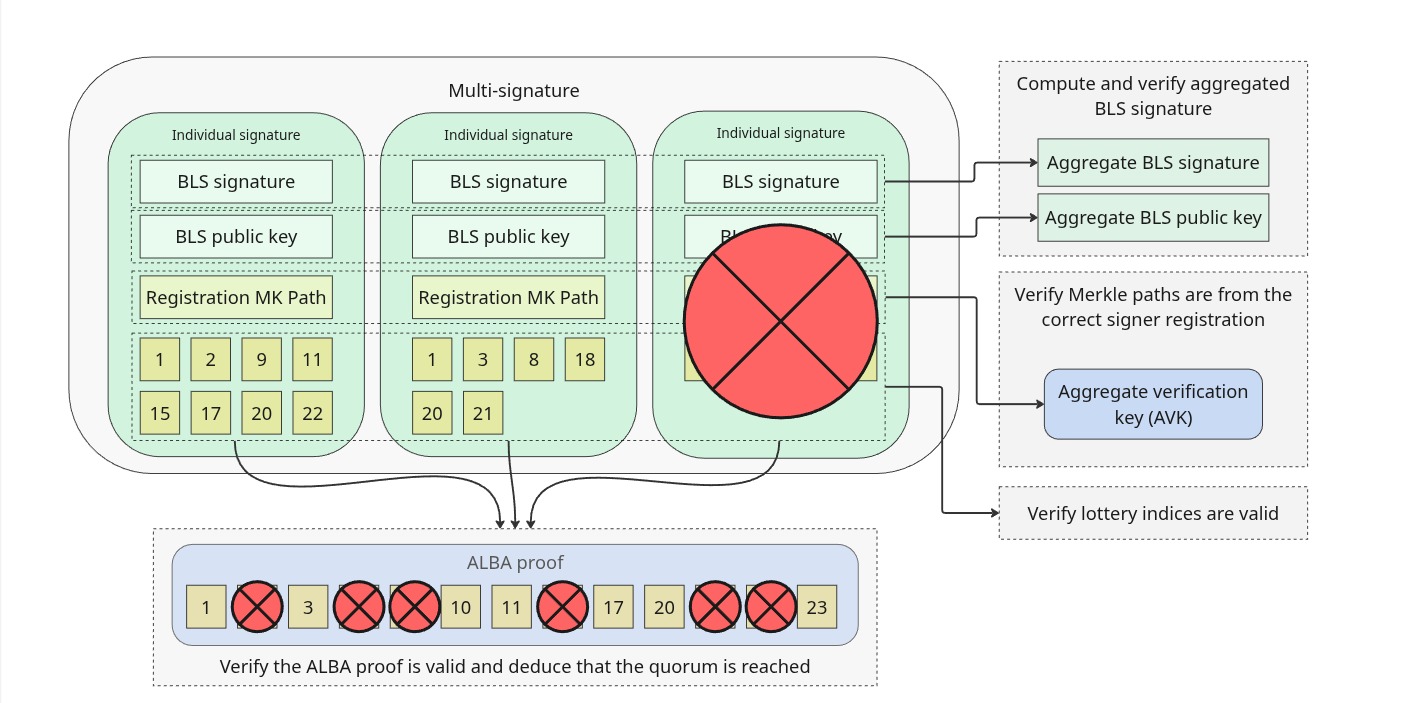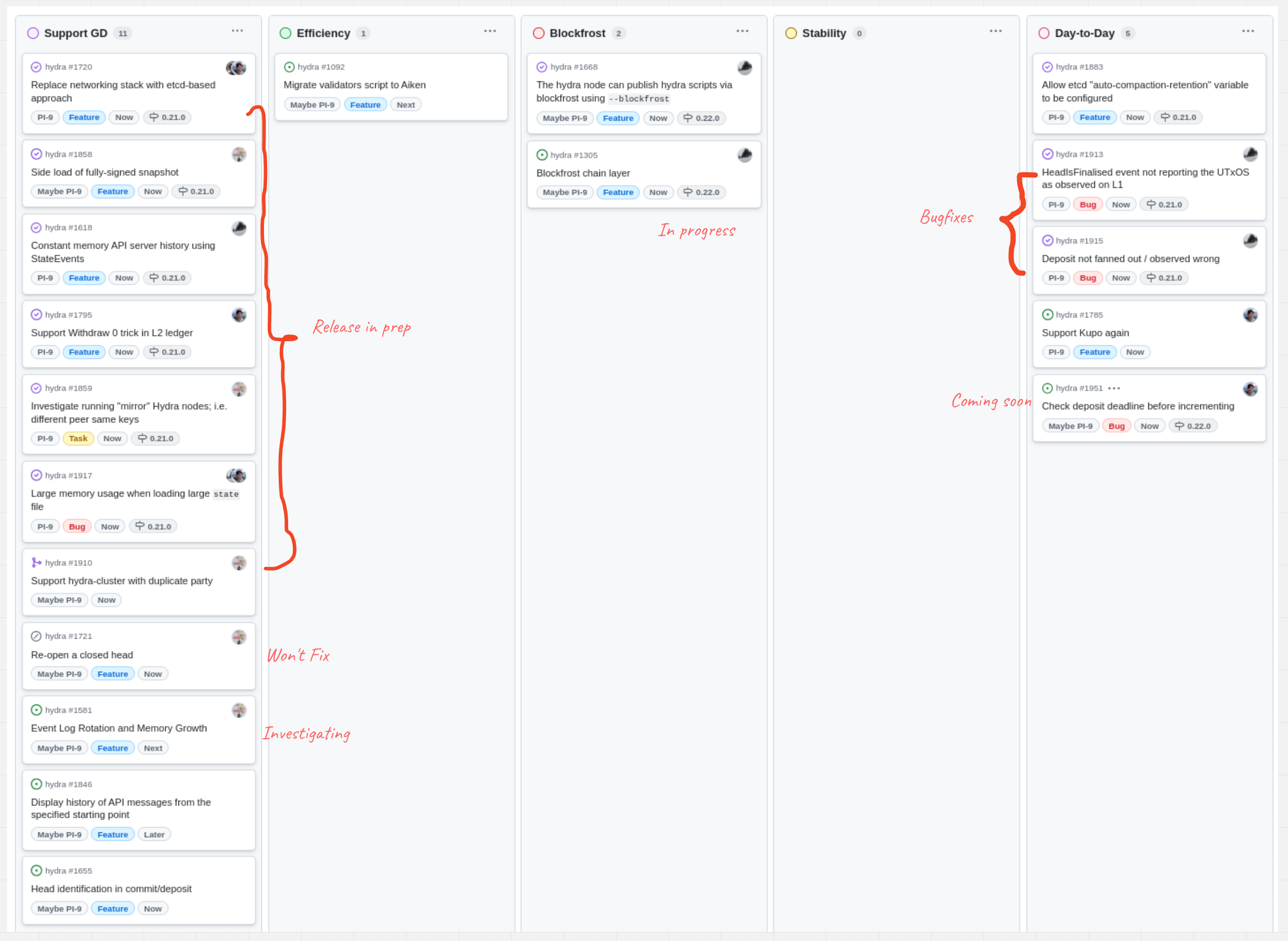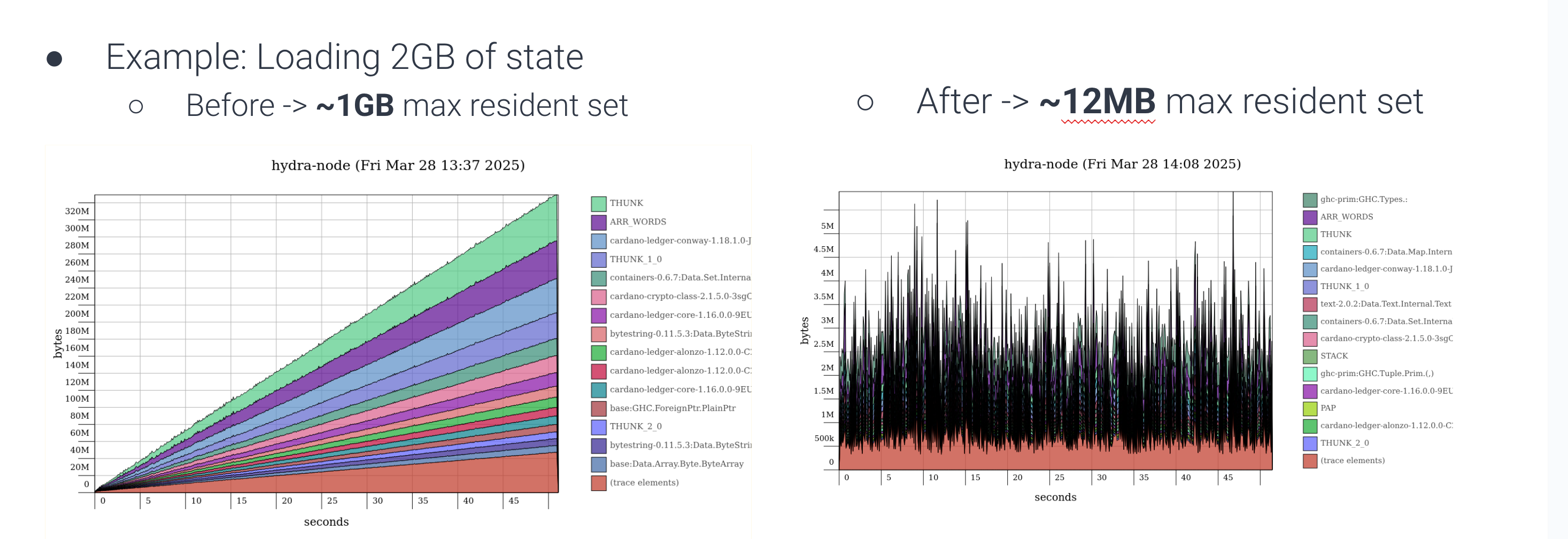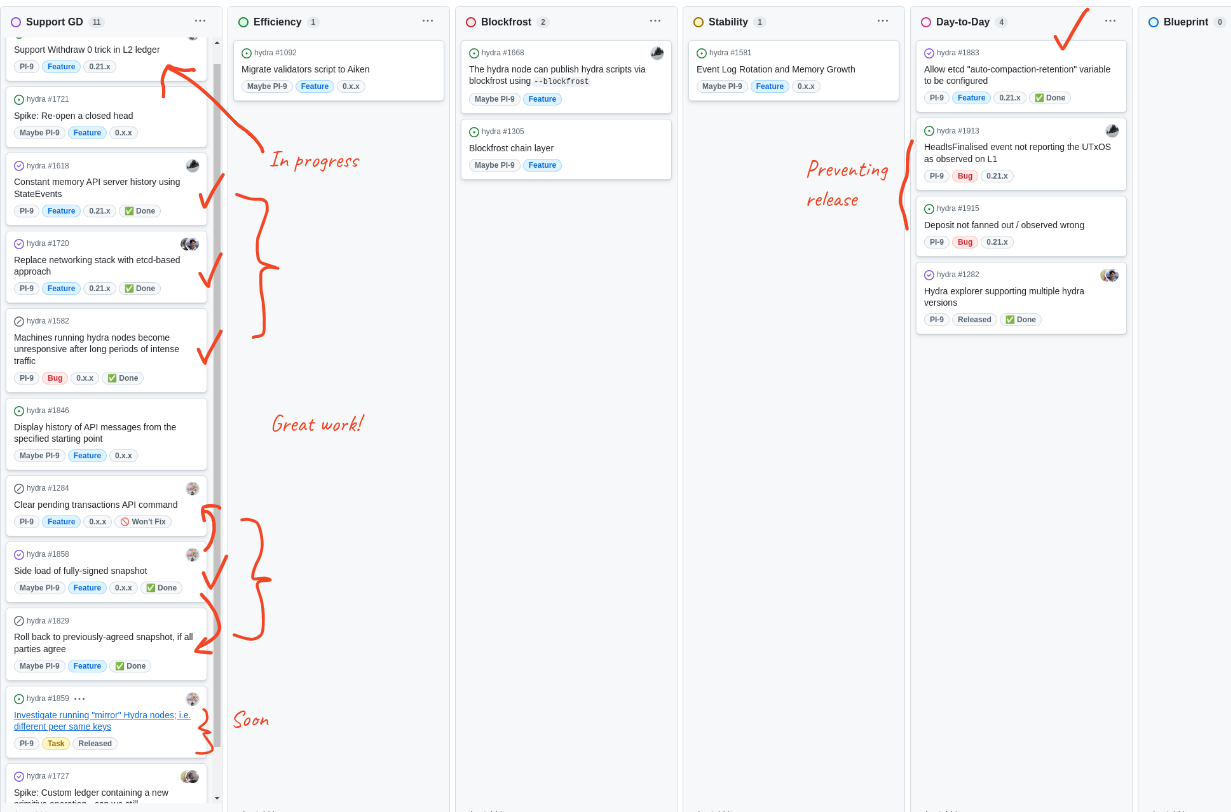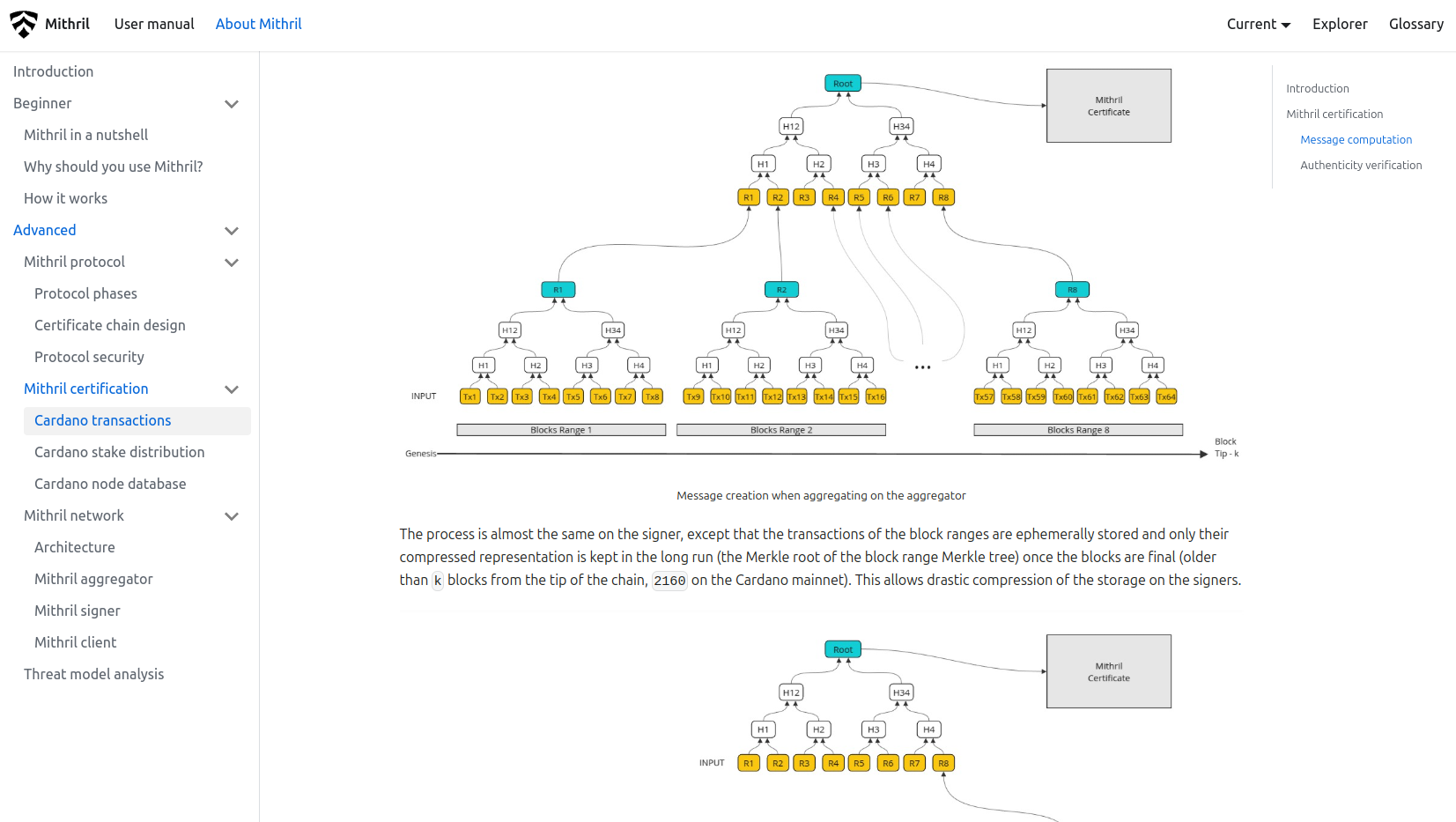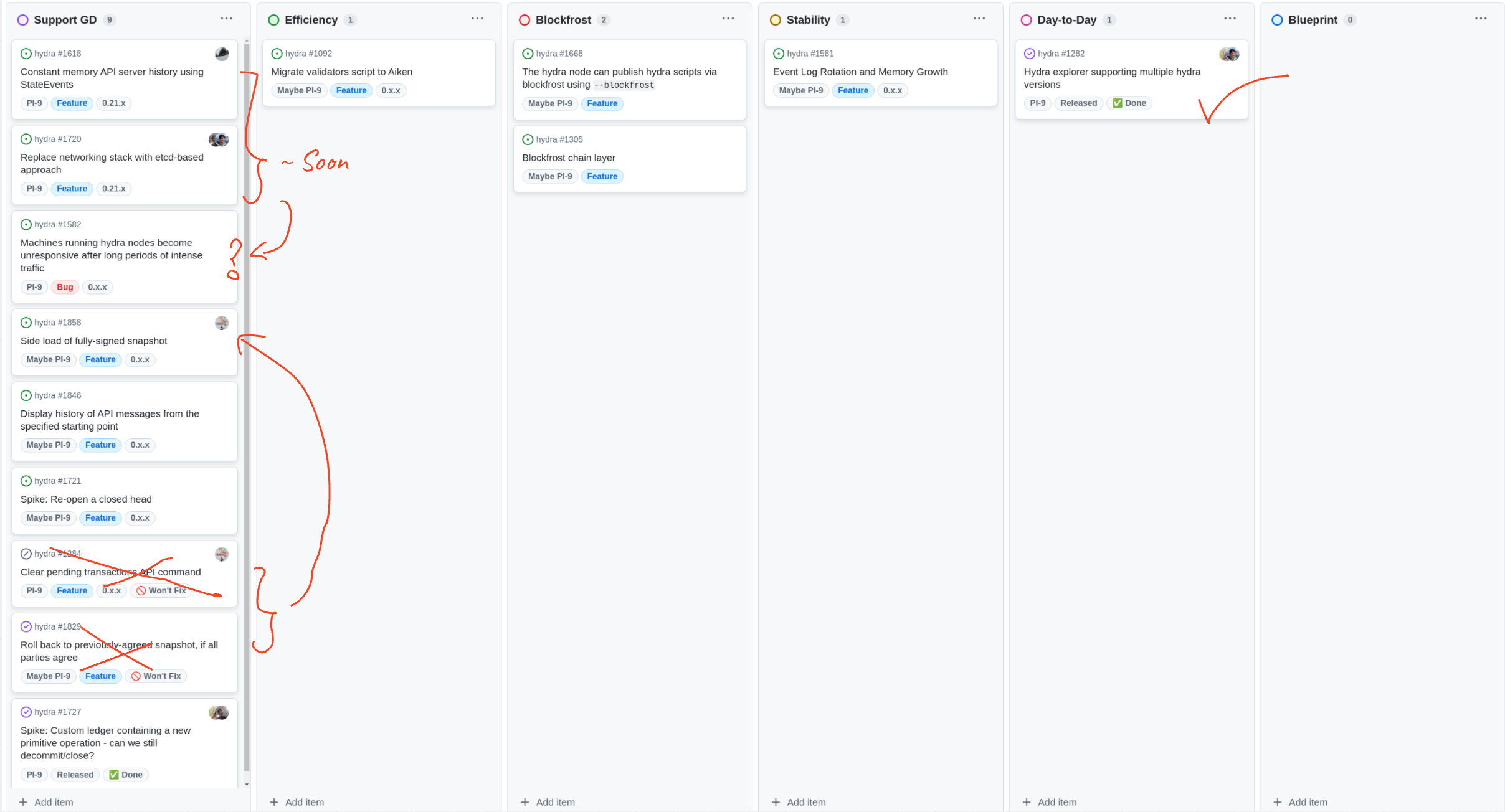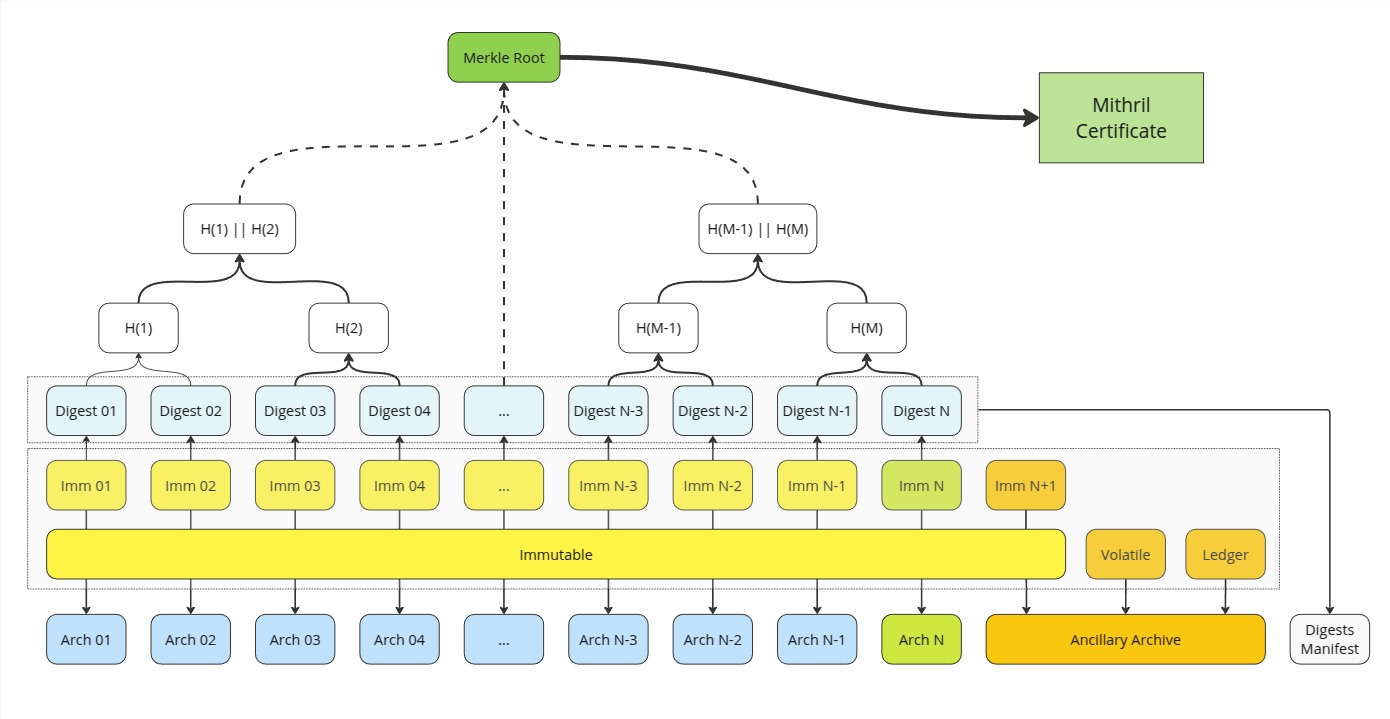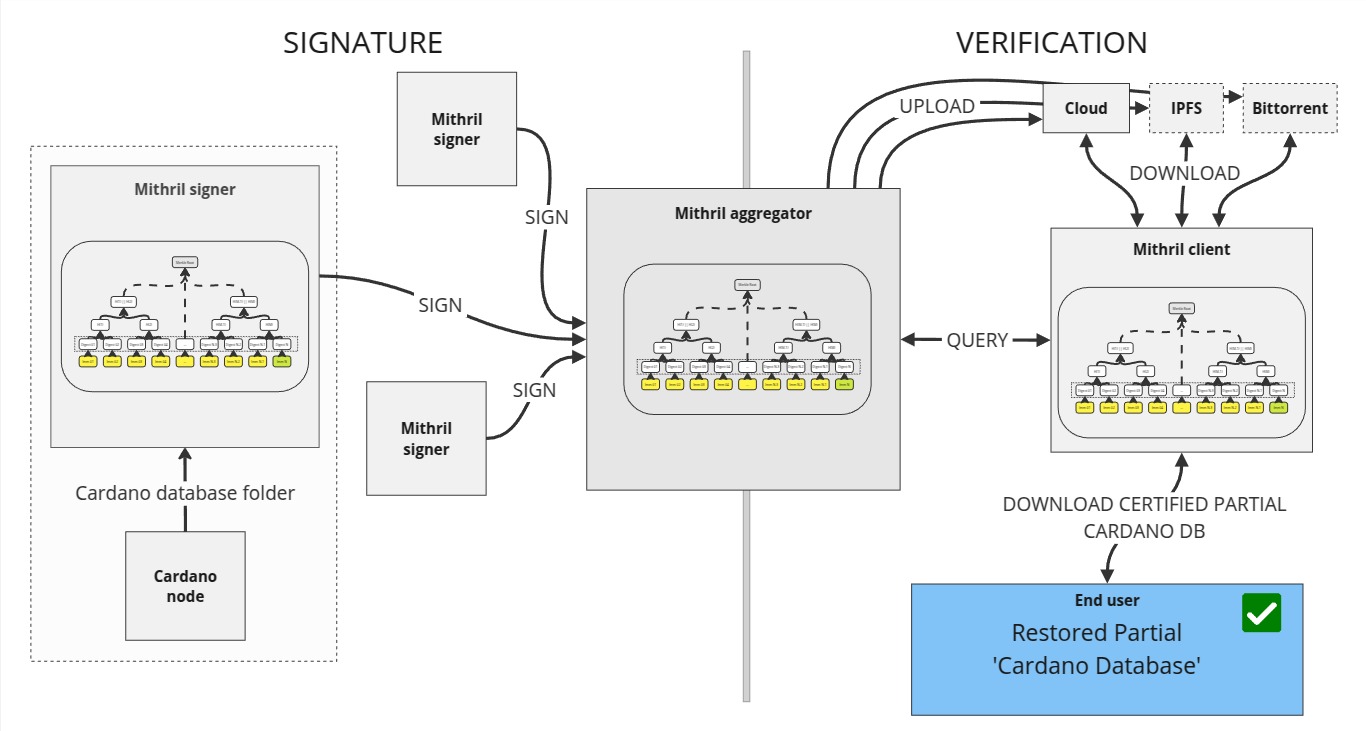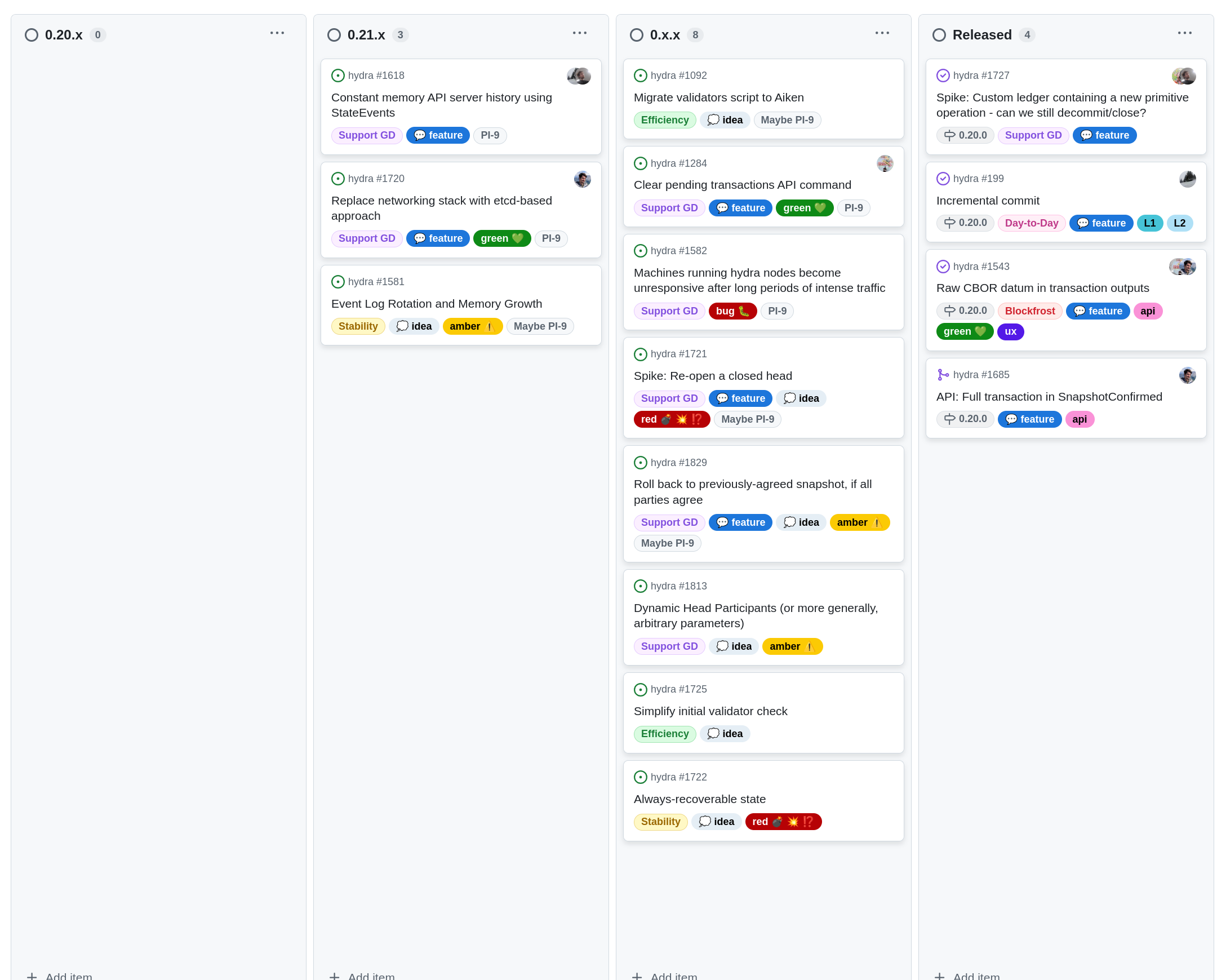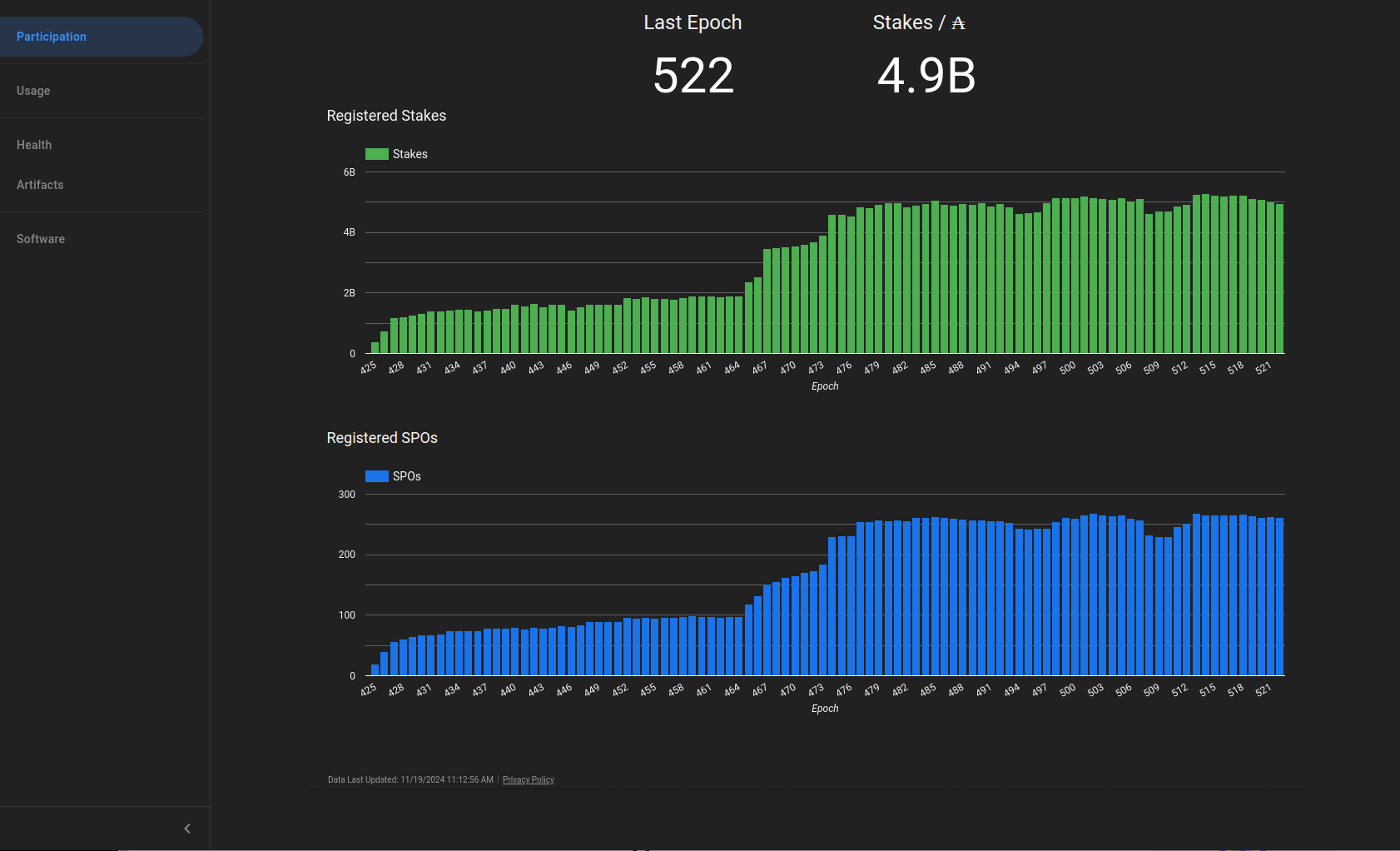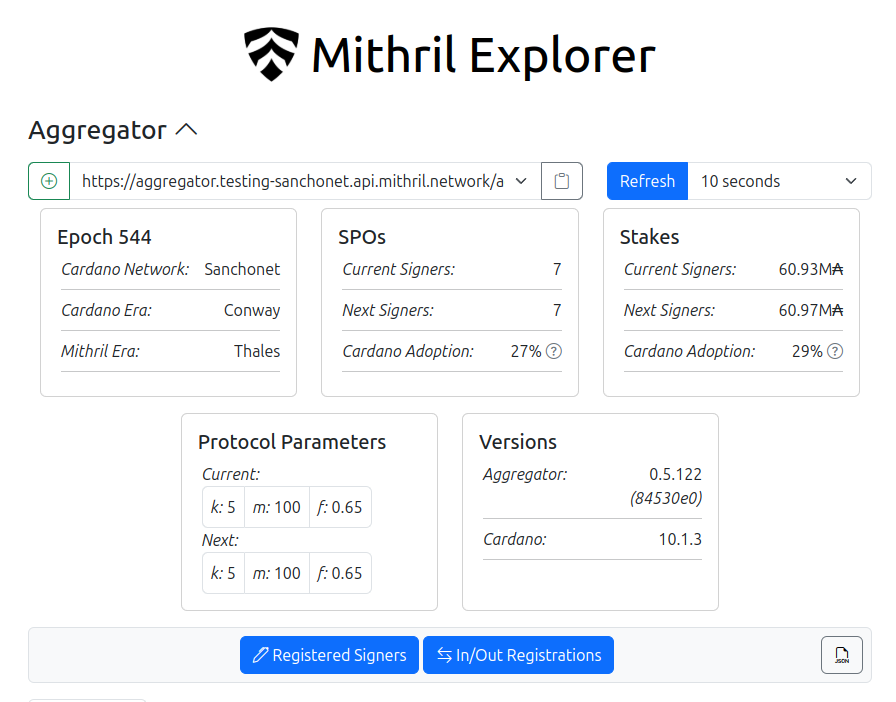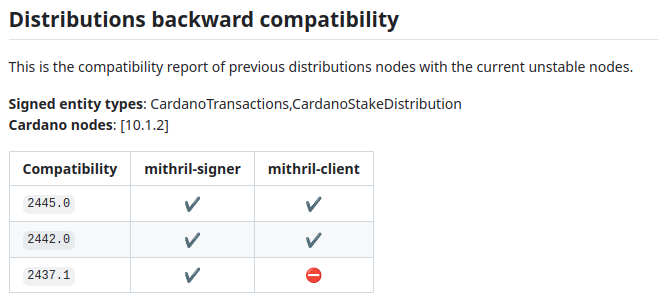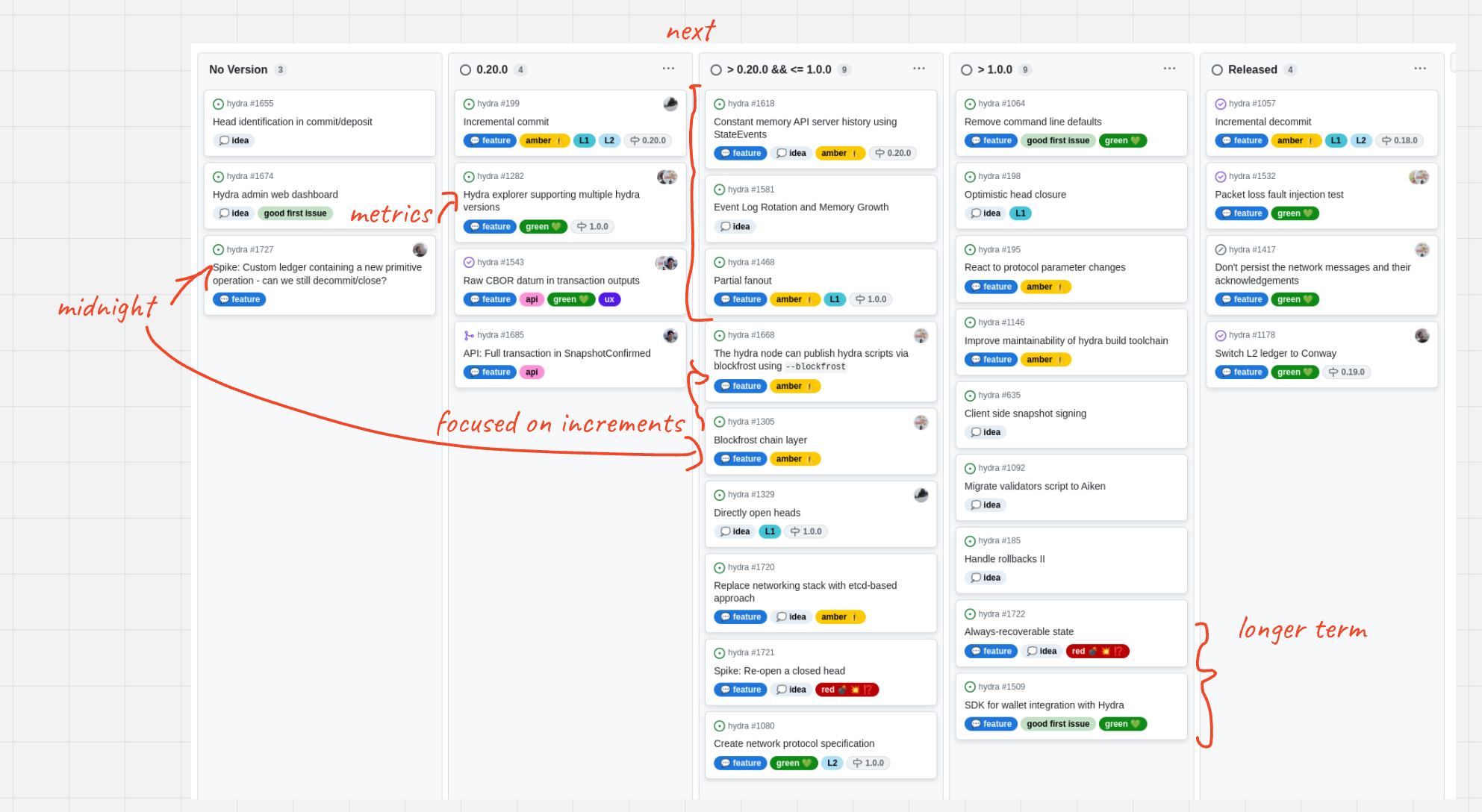This is a monthly report on the progress of 🐲 Hydra and 🛡 Mithril projects since August 2025. It serves as preparation for, and a written summary of, the monthly stakeholder review meeting. The meeting is announced on our Discord channels and held on Google Meet. This month, the meeting took place on August 27, 2025, using the slides provided here, and the recording is available here.
Mithril
Issues and pull requests closed in August
Roadmap
Below are the latest updates on our roadmap:
- DMQ signature diffusion prototype #2402. We have implemented a end to end test of the DMQ protocol for the Mithril nodes, and the networking team has kept implementing the mini-protocols in the Haskell DMQ node
- Simple aggregation Halo2 – prototype #2526. We collaborated with the innovation team on developing a prototype for a SNARK circuit for Mithril certificates based on Halo2
- Refactor STM library #2567. We continued the second phase of the STM library refactoring.
DMQ implementation update
Here is the current status of the DMQ implementation:
| Mini-protocols | Pallas | Mithril Signer | Mithril Aggregator | Mithril Relay | Haskell DMQ Node |
|---|
| N2C Submission | ✓ | ✓ | - | ✓* | In progress |
| N2C Notification | ✓ | Planned | ✓ | ✓* | In progress |
| N2N Diffusion | Planned | - | - | - | In progress |
*: for testing purpose only
The network team has kept implementing the DMQ mini-protocols in the Haskell DMQ node. In the mean time, we have implemented a fake DMQ node which allowed us to test the Mithril nodes implementation of the DMQ protocol in an end to end test. This fake DMQ node is implemented in the Mithril relay which now exposes the server sides of the n2c submission and notification mini-protocols. Once the Haskell DMQ node is ready, we will replace the fake DMQ node with the real implementation.
Prototyping SNARK circuit for Mithril certificates
We worked on creating a Mithril certificate with a multi-signature that meets specific requirements for on-chain deployment. The current concatenation proof approach does not meet these constraints, as it exceeds 150 kB with a full stake distribution of approximately 2,000 individual signatures. This size is too large for on-chain storage (our target is < 16 kB).
Requirements and solution
Our target requirements for the new approach are:
- Certificate storage on-chain with size under 16 kB
- Fast verification performance (few milliseconds)
- Relatively fast generation time (few minutes)
- On-chain verification capability.
We selected a SNARK generated with Halo2 as our solution, which provides:
- Expected multi-signature size of 1-10 kB
- Expected verification time of 1-10 ms
- Expected generation time of 1-10 min
- Available primitives for smart contracts.
Implementation approaches
Faithful circuit transcription: Our initial approach attempted to create a circuit that faithfully replicates the actual concatenation proof, including BLS verification of aggregated signatures, Merkle proof inclusion in signer registration, and eligibility check with lottery. However, this proved unrealistic as just the BLS verification alone required approximately 50 seconds with 2^19 constraints on a 48 CPU / 384 GB machine.
Modified circuit transcription: We then developed a circuit that verifies all individual signatures one by one and makes sure that the lottery indices reach the quorum. We needed to modify the curve, individual signatures, hash function, and lottery function. This approach proved very efficient for approximately 2,000 signatures, achieving a certificate size of 4 kB, verification time of 7 ms, and generation time of 6 minutes.
ALBA proof circuit: We also tested an ALBA proof implementation and this approach proved even more efficient, maintaining the same 4 kB certificate size and 7 ms verification time while reducing generation time to just 1.5 minutes.
Additionally, we also tested IVC (recursive SNARK) to limit the number of constraints, though this showed no substantial gain over the other approaches.
Roadmap
Short term: Assess the minimal modifications needed for STM implementation, create a full report, adapt the STM library for SNARK compatibility (a breaking change that will require a Mithril era upgrade), and verify a Mithril certificate in a smart contract.
Mid term: Deploy a SNARK for Mithril certificates on mainnet, audit both the STM and SNARK implementations, and implement ALBA, Fait accompli, and their corresponding SNARKs.
Long term: Evaluate folding and recursive techniques for creating a SNARK of the entire certificate chain.
Protocol status
The protocol operated smoothly on the release-mainnet network with the following metrics:
- Registered stake:
4.7B₳ (22% of the Cardano network)
- Registered SPOs:
249 (9% of the Cardano network)
- Full Cardano database restorations:
710 restorations
- Signer software adoption:
82.9% of the SPOs are running a recent version (one of the last three releases).
You can find more information on the Mithril protocol insights dashboard.
Hydra
Issues and pull requests closed in August
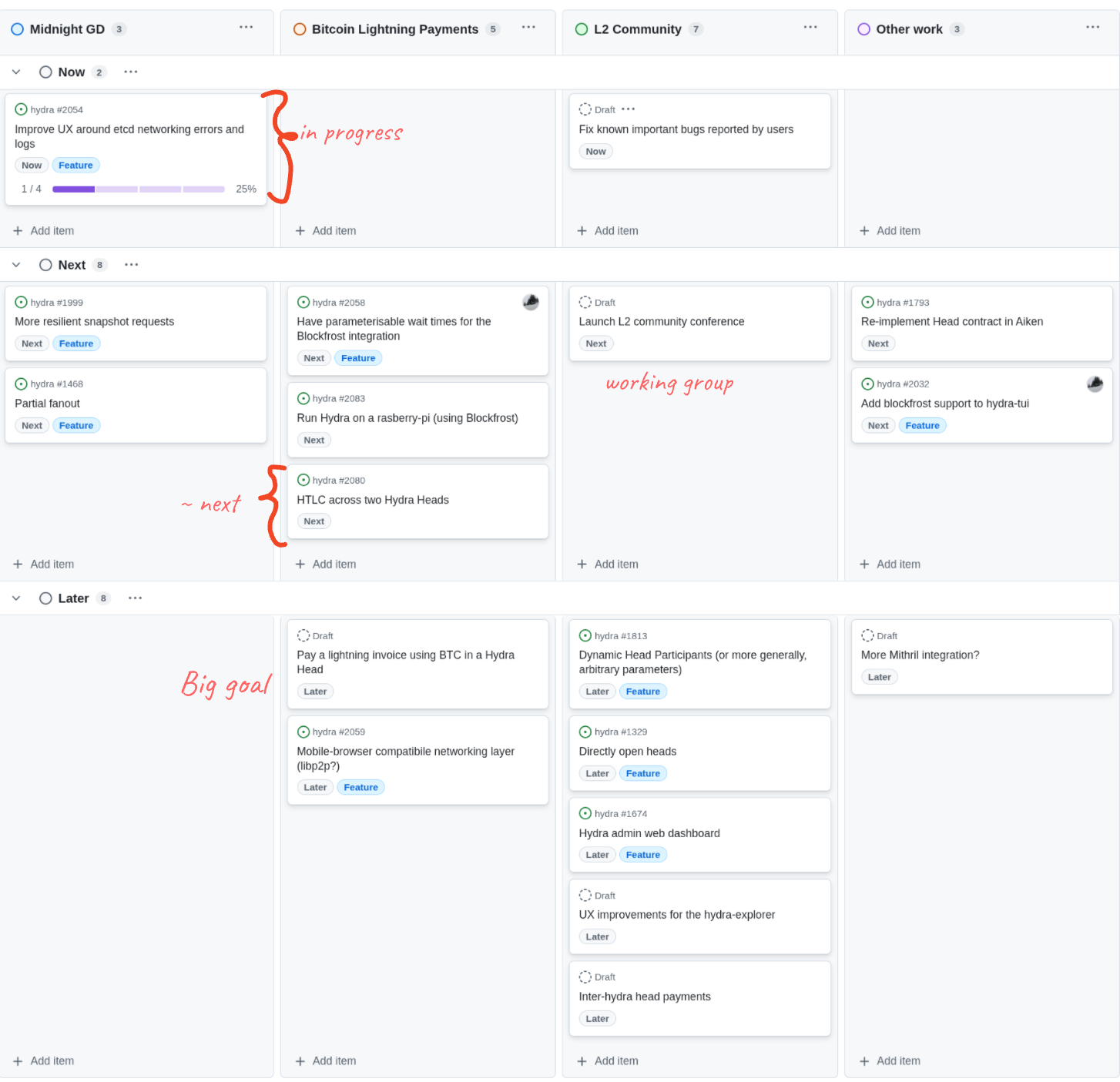 Snapshot of the new roadmap with features and ideas
Snapshot of the new roadmap with features and ideas
This month, notable roadmap updates include:
This release builds on 0.22.0 and includes many important fixes
observed while testing Hydra for a large operational use case. In particular, we:
- Fixed the API not correctly dealing with log rotation
- Reduced message spam in the presence of mirror nodes
- Fix a bug with an internal queue causing a deadlock
- Fixed an issue with
etcd lease renewal
- Implemeneted a workaround for a blocking bug observed with
etcd
- Fixed a bug where the hydra-node could stall after a restart (during
ReplayingState)
- Dropped transactions that could lead to a stuck head.
Partial Ada commits
Not yet released, but on master you can now commit part of the UTXO input:
#2140. Thanks to
aniadev for the great feature request!
Hydra Doom at RareEvo (again!)
hydra-doom returned to Rare Evo 2025. This time running on hydra 0.22.4 on a public network (preprod).
This ran on an ASUS NUC 14 with an N97 chip and 16 GB of RAM, allowing us to run both the Hydra head and a full preprod node directly on the device using the UTxO-HD on-disk backend from cardano-node.
Example grafana dashboard for node operators
We delivered a minimal monitoring setup using Prometheus and Grafana to provide insight into Hydra node activity, including snapshot processing and peer connectivity.
This was added as part of the Getting Started tutorial, making it easier for users to quickly visualize the exposed node metrics.
The setup focused exclusively on metrics exposed by Hydra nodes and did not include system-level metrics such as CPU, memory, disk, or network usage.
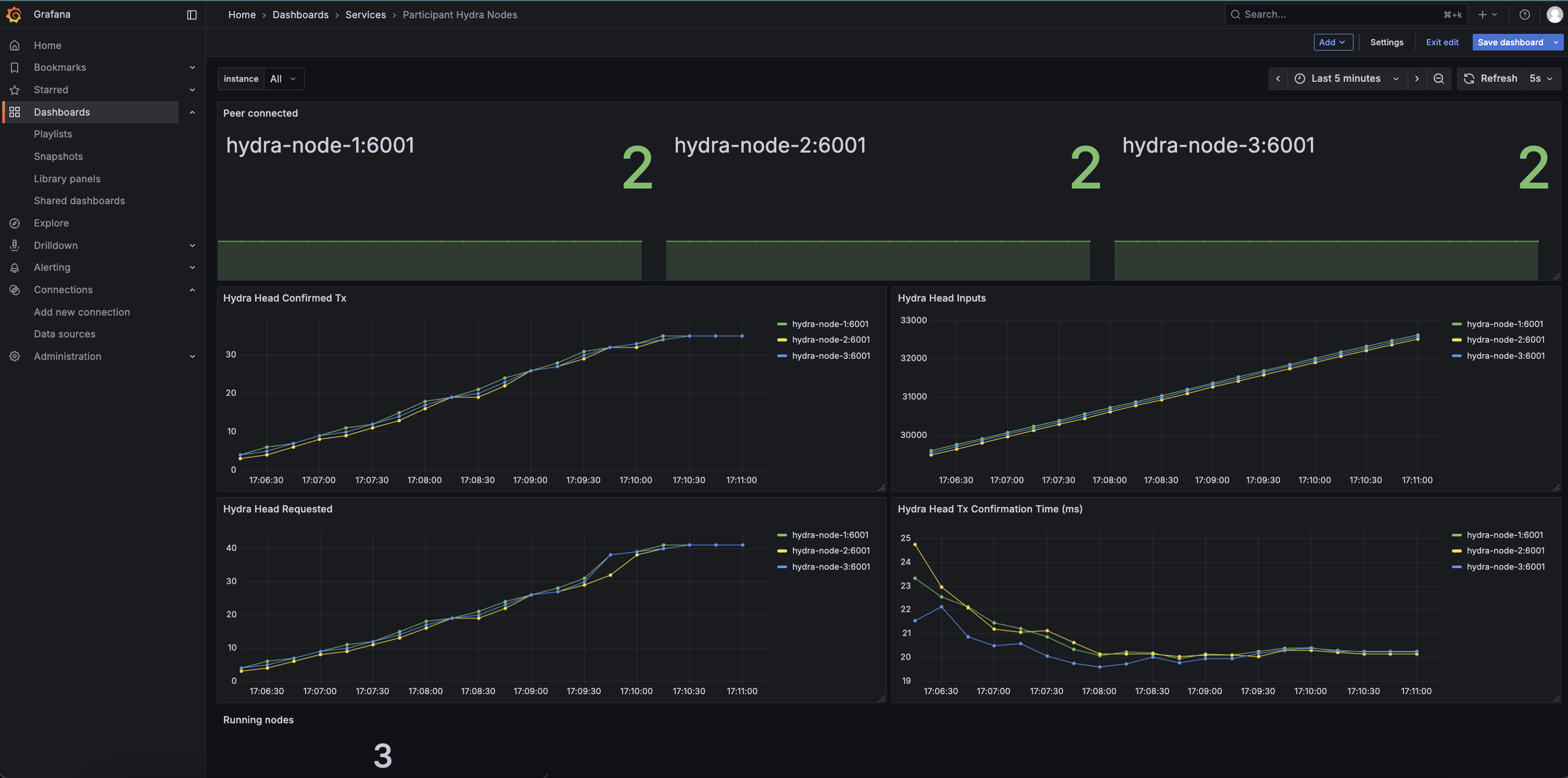
Acknowledgment: This dashboard was largely based on the work originally done by @jmagan — thanks for laying the groundwork! 🙏
Roadmap update
- Delivered all the essential features for the Glacier Drop
- Working towards a lightweight Hydra node PoC
- Working towards inter-head payments via a HTLC PoC
- Investigating partial fanout.
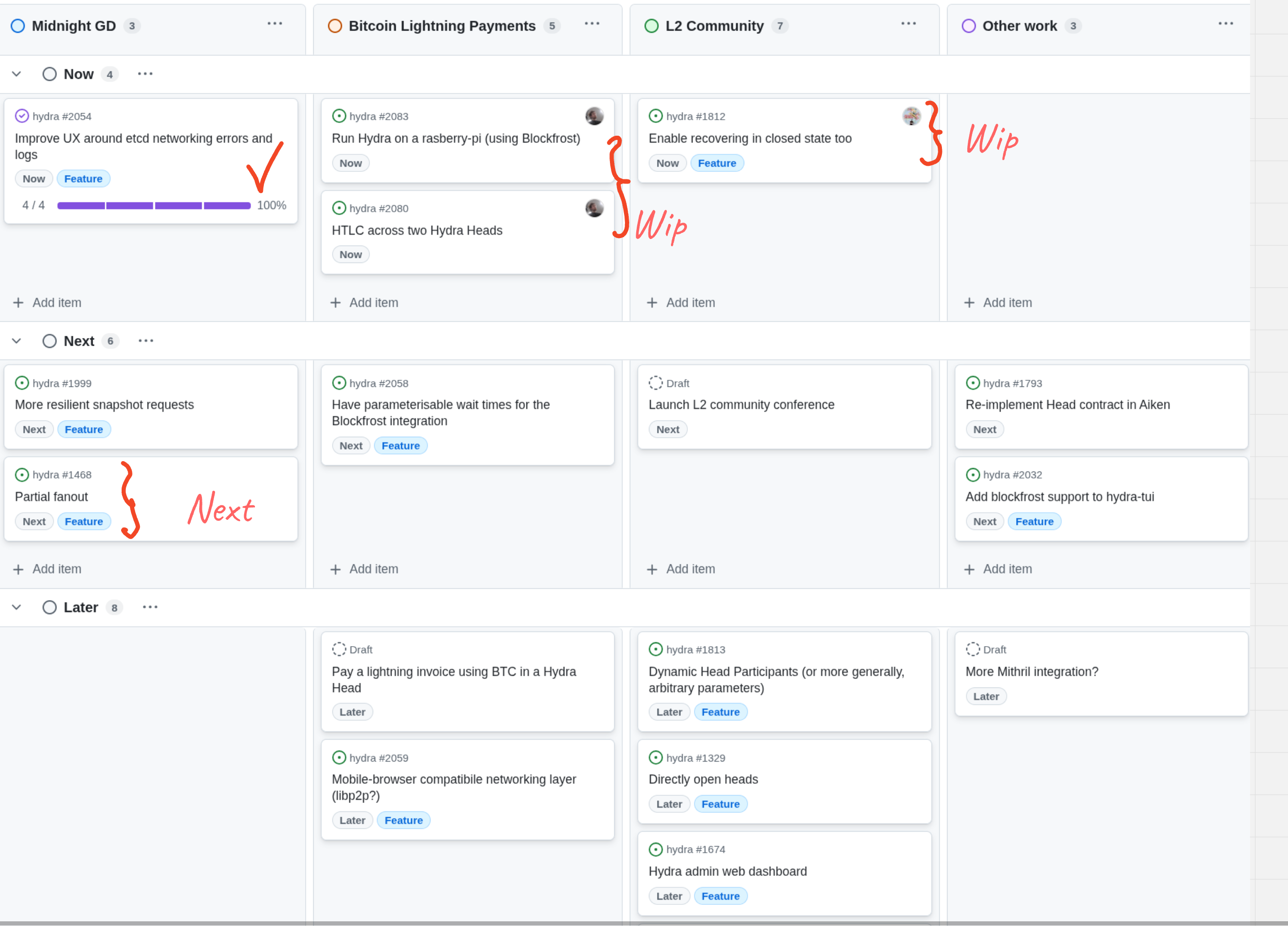
Links
The monthly review meeting for August 2025 took place on August 27, 2025, via Google Meet.
The presentation slides and the recording are available for review.
